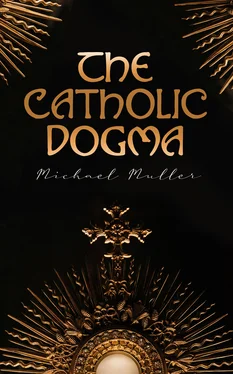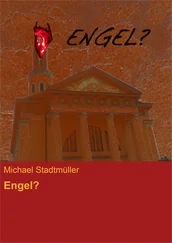Michael Müller - The Catholic Dogma
Здесь есть возможность читать онлайн «Michael Müller - The Catholic Dogma» — ознакомительный отрывок электронной книги совершенно бесплатно, а после прочтения отрывка купить полную версию. В некоторых случаях можно слушать аудио, скачать через торрент в формате fb2 и присутствует краткое содержание. Жанр: unrecognised, на английском языке. Описание произведения, (предисловие) а так же отзывы посетителей доступны на портале библиотеки ЛибКат.
- Название:The Catholic Dogma
- Автор:
- Жанр:
- Год:неизвестен
- ISBN:нет данных
- Рейтинг книги:4 / 5. Голосов: 1
-
Избранное:Добавить в избранное
- Отзывы:
-
Ваша оценка:
- 80
- 1
- 2
- 3
- 4
- 5
The Catholic Dogma: краткое содержание, описание и аннотация
Предлагаем к чтению аннотацию, описание, краткое содержание или предисловие (зависит от того, что написал сам автор книги «The Catholic Dogma»). Если вы не нашли необходимую информацию о книге — напишите в комментариях, мы постараемся отыскать её.
The Catholic Dogma — читать онлайн ознакомительный отрывок
Ниже представлен текст книги, разбитый по страницам. Система сохранения места последней прочитанной страницы, позволяет с удобством читать онлайн бесплатно книгу «The Catholic Dogma», без необходимости каждый раз заново искать на чём Вы остановились. Поставьте закладку, и сможете в любой момент перейти на страницу, на которой закончили чтение.
Интервал:
Закладка:
Some time after, when the reforming spirit had reached its full growth, Dudithius, a learned Protestant divine, in his epistle to Beza, wrote: "What sort of people are our Protestants, straggling to and fro, and carried about by every wind of doctrine, sometimes to this side, sometimes to that? You may, perhaps, know what their sentiments in matters of religion are to-day, but you can never tell precisely what they will be to-morrow. In what article of religion do these churches agree which have cast off the Bishop of Rome? Examine all from top to bottom, and you will scarce find one thing affirmed by one which was not immediately condemned by another for wicked doctrine." The same confusion of opinions was described by an English Protestant, the learned Dr. Walton, about the middle of the last century, in his preface to his Polyglot, where he says: " Aristarchus heretofore could scarce find seven wise men in Greece; but with us, scarce are to be found so many idiots. For all are doctors, all are divinely learned: there is not so much as the meanest fanatic who does not give you his own dreams for the word of God. The bottomless pit seems to have been opened, from whence a smoke has arisen which has darkened the heavens and the stars, and locusts have come out with stings, a numerous race of sectaries and heretics, who have renewed all the ancient heresies, and invented many monstrous opinions of their own. These have filled our cities, villages, camps, houses, nay, our pulpits, too, and lead the poor deluded people, with them to the pit of perdition." "Yes," writes another author, "every ten years, or nearly so, the Protestant theological literature undergoes a complete revolution. What was admired during the one decennial period is rejected in the next, and the image which they adored is burnt, to make way for new divinities; the dogmas which were held in honor, fall into discredit; the classical treatise of morality is banished among the old books out of date; criticism overturns criticism; the commentary of yesterday ridicules that of the previous day, and what was clearly proved in 1840, is not less clearly disproved in 1850. The theological systems of Protestantism are as numerous as the political constitutions of France - one revolution only awaits another." - (Le Semeur, June, 1840.) It is indeed utterly impossible to keep the various members of one single sect from perpetual disputes, even about the essential truths of revealed religion. And those religious differences exist not only in the same sect, not only in the same country and town, but even in the same family. Nay, the self-same individual, at different periods of his life, is often in flagrant contradiction with himself. To-day he avows opinions which yesterday he abhorred, and to-morrow he will exchange these again for new ones. At last, after belonging, successively, to various new-fangled sects, he generally ends by professing unmitigated contempt for them all. By their continual disputes and bickerings, and dividing and subdividing, the various Protestant sects have made themselves the scorn of honest minds, the laughing–stock of the pagan and the infidel.
These human sects, the "works of the flesh," as St. Paul calls them, alter their shape, like clouds, but "feel no blow, says Mr. Marshall, "because they have no substance." They fight a good deal with one another, but nobody minds it, not even themselves, nor cares what becomes of them. If one human sect perishes, it is always easy to make another, or half a dozen. They have the life of worms, and propagate by corruption. Their life is so like death that, except by the putridity which they exhale in both stages, it is impossible to tell which is which, and when they are buried, nobody can find their graves: They have simply disappeared.
The spirit of Protestantism, or the spirit of revolt against God and his Church, sprung up from the Reformers' spirit of incontinency, obstinacy, and covetousness. Luther, in despite of the vow ho had solemnly made to God of keeping continency, married a nun equally bound as himself to that sacred religious promise; but, as St. Jerome says, "it is rare to find a heretic that loves chastity."
Luther's example had indeed been anticipated by Carlostadtius, a priest and ringleader of the Sacramentarians, who had married a little before; and it was soon followed, by most of the heads of the Reformation.
Zwinglius, a priest and chief of the sect that bore his name, took a wife.
Bucer, a member of the order of St. Dominic, became a Lutheran, left his cloister, and married a nun.
OEcolampadius, a Brigitin monk, became a Zwinglian, and also married.
Cranmer, Archbishop of Canterbury, had also his wife.
Peter Martyr, a canon-regular, embraced the doctrine of Calvin, but followed the example of Luther, and married a nun.
Ochin, General of the Capuchins, became a Lutheran, and also married.
Thus the principal leaders in the Reformation went forth, preaching the new gospel, with two marks upon them: apostasy from faith, and open violation of the moat sacred vows.
The passion of lust, as has been already said, hurried also Henry VIII. of England into a separation from the Catholic Church, and ranked him among the Reformers.
Those wicked men could not be expected to teach a holy doctrine; they preached up a hitherto unheard-of "evangelical liberty," as they styled it. They told their fellow-men that they were no longer obliged to subject their understanding to the mysteries of faith, and to regulate their actions according to the laws of Christian morality; they told that everyone was free to model his belief and practice as it suited his inclinations. In pursuance of this accommodating doctrine, they dissected the Catholic faith till they reduced it to a mere skeleton; they lopped off the reality of the body and blood of Christ in the Holy Eucharist, the divine Christian sacrifice offered in the Mass, confession of sins, most of the sacraments, penitential exercises, several of the canonical books of Scripture, the invocation of saints, celibacy, most of the General Councils of the Church, and all present Church authority; they perverted the nature of justification, asserting that faith alone suffices to justify man; they made God the author of sin, and maintained the observance of the commandments to be impossible.
As a few specimens of Luther's doctrine, take the following: "God's commandments are all equally impossible." (De Lib. Christ., t. ii., fol. 4.) "No sins can damn a man, but only unbelief." (De Captiv. Bab., t. ii., fol. 171.) "God is just, though by his own will he lays us under the necessity of being damned, and though he damns those who have not deserved it." (Tom. ii., fell. 434, 436.) "God works in us both good, and evil." (Tom, ii.., fol. 444.) "Christ's body is in every place, no less than the divinity itself." (Tom. iv., fol. 37.) Then, for his darling principle of justification by faith, in his eleventh article against Pope Leo, he says: "Believe strongly that you are absolved, and absolved you will be, whether you have contrition or no."
Again, in his sixth article: "The contrition which is acquired by examining, recollecting, and detesting one's sins, whereby a man calls to mind his life past, in the bitterness of his soul, reflecting on the heinousness and multitude of his offences, the loss of eternal bliss, and condemnation to eternal woe, - this contrition, I say, makes a man a hypocrite, nay, even a greater sinner than he was before."
Thus, after the most immoral life, a man has a compendious method of saving himself, by simply believing that his sins are remitted through the merits of Christ.
As Luther foresaw the scandal that would arise from his own and such like sacrilegious marriages, he prepared the world for it, by writing against the celibacy of the clergy and all religious vows; and all the way up, since his time, he has had imitators. He proclaimed that all such vows "were contrary to faith, to the commandments of God, and to evangelical liberty." (De Votis Monast.) He said again: "God disapproves of such a vow of living in continency, equally as if I should vow to become the mother of God, or to create a new world." (Epist. ad Wolfgang Reisemb.) And again: "To attempt to live unmarried, is plainly to fight against God."
Читать дальшеИнтервал:
Закладка:
Похожие книги на «The Catholic Dogma»
Представляем Вашему вниманию похожие книги на «The Catholic Dogma» списком для выбора. Мы отобрали схожую по названию и смыслу литературу в надежде предоставить читателям больше вариантов отыскать новые, интересные, ещё непрочитанные произведения.
Обсуждение, отзывы о книге «The Catholic Dogma» и просто собственные мнения читателей. Оставьте ваши комментарии, напишите, что Вы думаете о произведении, его смысле или главных героях. Укажите что конкретно понравилось, а что нет, и почему Вы так считаете.












